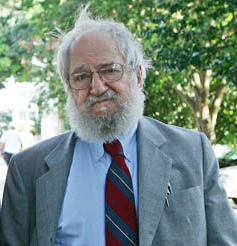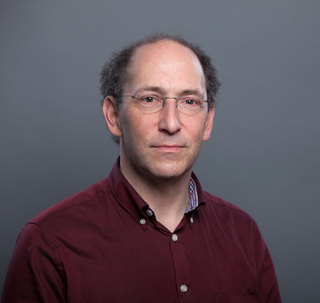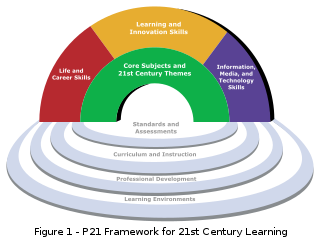Related Research Articles

Wolfram Mathematica is a software system with built-in libraries for several areas of technical computing that allow machine learning, statistics, symbolic computation, data manipulation, network analysis, time series analysis, NLP, optimization, plotting functions and various types of data, implementation of algorithms, creation of user interfaces, and interfacing with programs written in other programming languages. It was conceived by Stephen Wolfram, and is developed by Wolfram Research of Champaign, Illinois. The Wolfram Language is the programming language used in Mathematica. Mathematica 1.0 was released on June 23, 1988 in Champaign, Illinois and Santa Clara, California.
A computer algebra system (CAS) or symbolic algebra system (SAS) is any mathematical software with the ability to manipulate mathematical expressions in a way similar to the traditional manual computations of mathematicians and scientists. The development of the computer algebra systems in the second half of the 20th century is part of the discipline of "computer algebra" or "symbolic computation", which has spurred work in algorithms over mathematical objects such as polynomials.
Science education is the teaching and learning of science to school children, college students, or adults within the general public. The field of science education includes work in science content, science process, some social science, and some teaching pedagogy. The standards for science education provide expectations for the development of understanding for students through the entire course of their K-12 education and beyond. The traditional subjects included in the standards are physical, life, earth, space, and human sciences.
Bloom's taxonomy is a set of three hierarchical models used for classification of educational learning objectives into levels of complexity and specificity. The three lists cover the learning objectives in cognitive, affective and psychomotor domains. The cognitive domain list has been the primary focus of most traditional education and is frequently used to structure curriculum learning objectives, assessments and activities.

In contemporary education, mathematics education—known in Europe as the didactics or pedagogy of mathematics—is the practice of teaching, learning, and carrying out scholarly research into the transfer of mathematical knowledge.

Wolfram Research, Inc. is an American multinational company that creates computational technology. Wolfram's flagship product is the technical computing program Wolfram Mathematica, first released on June 23, 1988. Other products include WolframAlpha, Wolfram SystemModeler, Wolfram Workbench, gridMathematica, Wolfram Finance Platform, webMathematica, the Wolfram Cloud, and the Wolfram Programming Lab. Wolfram Research founder Stephen Wolfram is the CEO. The company is headquartered in Champaign, Illinois, United States.
Andrea A. diSessa is an education researcher and author of the book Turtle Geometry about Logo. He has also written highly cited research papers on the epistemology of physics, educational experimentation, and constructivist analysis of knowledge. He also created, with Hal Abelson, the Boxer Programming Environment at the Massachusetts Institute of Technology.
Cognitive apprenticeship is a theory that emphasizes the importance of the process in which a master of a skill teaches that skill to an apprentice.

Constructionist learning is the creation by learners of mental models to understand the world around them. Constructionism advocates student-centered, discovery learning where students use what they already know to acquire more knowledge. Students learn through participation in project-based learning where they make connections between different ideas and areas of knowledge facilitated by the teacher through coaching rather than using lectures or step-by-step guidance. Further, constructionism holds that learning can happen most effectively when people are active in making tangible objects in the real world. In this sense, constructionism is connected with experiential learning and builds on Jean Piaget's epistemological theory of constructivism.
In psychology, number sense is the term used for the hypothesis that some animals, particularly humans, have a biologically determined ability that allows them to represent and manipulate large numerical quantities. The term was popularized by Stanislas Dehaene in his 1997 book "The Number Sense," but originally named by the mathematician Tobias Dantzig in his 1930 text Number: The Language of Science.
Reform mathematics is an approach to mathematics education, particularly in North America. It is based on principles explained in 1989 by the National Council of Teachers of Mathematics (NCTM). The NCTM document Curriculum and Evaluation Standards for School Mathematics (CESSM) set forth a vision for K–12 mathematics education in the United States and Canada. The CESSM recommendations were adopted by many local- and federal-level education agencies during the 1990s. In 2000, the NCTM revised its CESSM with the publication of Principles and Standards for School Mathematics (PSSM). Like those in the first publication, the updated recommendations became the basis for many states' mathematics standards, and the method in textbooks developed by many federally-funded projects. The CESSM de-emphasised manual arithmetic in favor of students developing their own conceptual thinking and problem solving. The PSSM presents a more balanced view, but still has the same emphases.
Futurekids, Inc. is a privately held internationally franchised K–12 educational software company headquartered in El Segundo, California, which focuses on technological literacy and computer literacy.
Computational thinking (CT) refers to the thought processes involved in formulating problems so their solutions can be represented as computational steps and algorithms. In education, CT is a set of problem-solving methods that involve expressing problems and their solutions in ways that a computer could also execute. It involves automation of processes, but also using computing to explore, analyze, and understand processes.

Conrad Wolfram is a British technologist and businessman known for his work in information technology and mathematics education reform. In June 2020, Wolfram released his first book, The Math(s) Fix: An Education Blueprint for the AI Age.
Statistics education is the practice of teaching and learning of statistics, along with the associated scholarly research.
Computer-Based Math is an educational project started by Conrad Wolfram in 2010 to promote the idea that routine mathematical calculations should be done with a computer.

21st century skills comprise skills, abilities, and learning dispositions identified as requirements for success in 21st century society and workplaces by educators, business leaders, academics, and governmental agencies. This is part of an international movement focusing on the skills required for students to prepare for workplace success in a rapidly changing, digital society. Many of these skills are associated with deeper learning, which is based on mastering skills such as analytic reasoning, complex problem solving, and teamwork, which differ from traditional academic skills as these are not content knowledge-based.
The computational knowledge economy is an economy 'where value is derived from the automated generation of knowledge.

A notebook interface or computational notebook is a virtual notebook environment used for literate programming, a method of writing computer programs. Some notebooks are WYSIWYG environments including executable calculations embedded in formatted documents; others separate calculations and text into separate sections. Notebooks share some goals and features with spreadsheets and word processors but go beyond their limited data models.
References
- ↑ Conrad Wolfram on Computational Thinking, gettingsmart.com, Aug 5, 2020.
- ↑ Computational Literacy and the big picture. Journal of Mathematical Thinking and Learning Vol 20, 2018
- ↑ The Math(s) Fix p28. ISBN 9781579550295
- ↑ UK Parliamentary Education Committee
- ↑ Journal of Computer Science Integration, Vol 1, 2018
- ↑ Educational Development Center